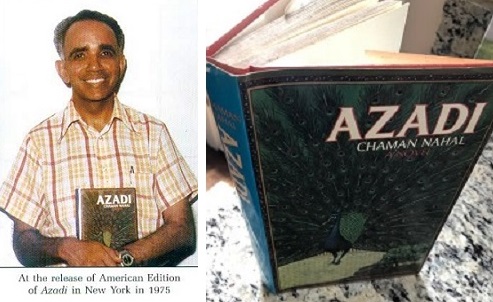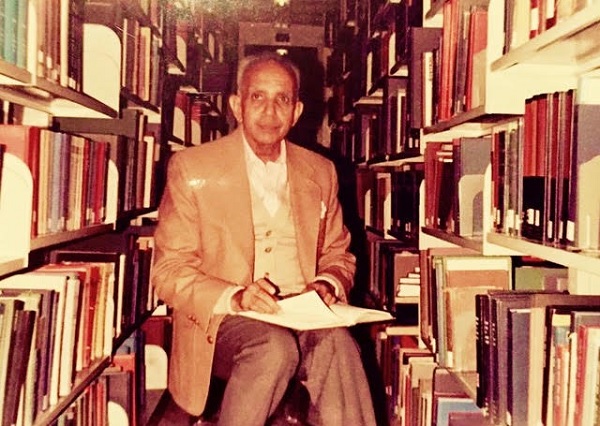Oct 16, 2025
Oct 16, 2025
Chaman Nahal's ‘Azadi’ is a simple and candid novel about the realities of India's independence and her partition. The words like sacrifice, struggle, non-violence sound very grand indeed but certain aspects of this important historical event were grotesque and gruesome. The novel strips off the layers of romance, valor and chivalry and lays bare certain historical realities which demand attention.

The British ruled India for centuries. Generations came and went by. The British continued to rule India skillfully and autocratically. They always maintained the show of a superior race - a race more beautiful, more sophisticated, more able and technologically more advanced. They held all the awe and mystery that a ruling class could possibly have. In their heart of hearts, Indians idolized and worshipped them. Mountbatten was a Prince Charming. He presented such a lovely picture with his pretty wife. The Indian psyche rested peacefully under the British banner. Voices of independence reached the masses but did not affect their psyche acutely. The general mentality was that although the fight was on but who would win over the unsurpassable British. Even by 1947, independence seemed a distant, remote reality. People like the character in the novel, Lala Kanshi Ram had deeply and unconsciously developed 'slave mentality'. They were not even aware of it. Their hearts bubbled with pride at the thought of being a part of an empire which was just supreme, unbeatable. They had even defeated Hitler. They were "an absolutely invincible race". For the younger generation also, it was a matter of immense pride to talk to an Englishman, to be friends with him, to have tea with him.
All this mental calm and assurance was shattered by partition. The cruel way in which the English granted freedom to India was enough to break the confidence of masses in them. The country was butchered without proper measures being taken to safeguard people's property, life or honor. Their lives were made tools and toys in the hands of ill luck and tragedy. What the people had known were noble feelings and high ideas - independence, equality and national pride. The result of all these noble feelings was rape, murder, death and separation. There was no connection between the effort and its result. People were simply betrayed. They felt cheated. Hindus were panic stricken. They were dead scared of the violent and cold temperament of Muslims. An humble servant of the English, Lala Kanshi Ram was flabbergasted that even "an Englishman was unable" to keep law and order. He felt so frustrated that he did what he would never dream of doing -"carrying on a spirited argument with one of his masters".
It is difficult to describe in words the extent to which Hindus in Pakistan felt demoralized. It was as though a butcher was literally tearing apart their bodies. They felt so defeated, so lost that the horror of horrors like abduction, naked marches by women, rapes, murders - ceased to arise any response in them. The group of Hindu refugees looked beaten a thousand times. Their tears had dried. They were reaching India butchered amputees. The hearts of some unfamiliar Muslims melted at the sight of group after group of disabled, wounded or weeping and lamenting men and women turned bend trudged on to whatever lay ahead of them. The children were not crying but they looked dazed. The most pathetic sight was of the very old weeping hysterically.
To some, it was proved that Indians did not deserve freedom. Indians had failed to manage things on their own. Given a chance Indians created as big a mess as could be dreamt of. Lala Kanshi Ram developed a firm belief - "We had no right to ask for freedom". There was no retaliation from Hindus when Muslims rampaged their colonies and localities. A dream was broken. The confidence in Indian-hood was lost.
Some of the leaders were working in pursuit of personal interest and selfish end. Chaman Nahal hints at it. Many historical studies have also described the episodes in this light. Maulana Abul Kalam's ‘India Wins Freedom’ created a furor and much controversy. But it is high time we realized that a united India could not have satisfied the ego of two leaders who both could not compromise with their individual wish to become the Prime Minister of the country. The question was as why the surrender should come from the side of Hindus only? No side was ready for compromise and the British were only two happy to strike the knife at the map. Two countries were made so that two Prime Ministers could be made. The leaders, in fact, rushed to independence at a fast pace which was totally unjustified. The Indians had actually won the battle on paper with Cripps Commission Report. Some patience, tactics and sacrifice on the part of our so called great leaders would have saved so many human lives and would have prevented loss of property, honor and confidence.
The creation of Pakistan solved no problem. There were Hindus everywhere in Pakistan and so were Muslims in India. The sixty five years of post British rule has proved that partition could not and has not solved communal problems. Innocent lives were unnecessarily victimized and sacrificed. Young girls and boys like Nur, Arun, Madhu, and Chandni were killed or separated from each other for no reason at all. Partition was not a historical necessity.

Vividly painting all the realities, Chaman Nahal poignantly touches the subject of women victims. Women were the worst victims. They were the hardest hit. The description of Sunayana, her grandeur, her untouched sophistication and then the description of the way in which she is dragged and ill treated by Capt. Rahmat-Ullan Khan is heart rending. Vulnerable and open to the savage instincts of brutes, these women had no protection. They sought to associate themselves with one man respectably but that protection proved insufficient in front of mass and systematized brutality. The point to be noted is that it was not only Hindu women who were ill treated; their counterparts in India were no less insulted. Seeing the pitiable and helpless condition of Muslim women in India, Lala Kanshi Ram stopped hating Muslims. In each hurt Muslim girl, he saw his own daughter Madhu whom he had lost in Pakistan in the violence erupted by the partition - "We are all equally guilty... Each of those girls in that procession at Amritsar was someone's Madhu”.
People expected freedom, dignity, equal opportunities and democracy and they received just the reverse. The whole novel is an anticlimax. The anticlimax reaches its climax when the refugees from Pakistan are treated in an abusive and indifferent manner at Delhi. There is no welcome. There are no emotional reunions. The refugees are treated as intruders - a nuisance. Lala Kanshi Ram is rebuked when he requests for a room and a shop to be allotted to him. He was made to feel "small and debased".
The novel drives home the pain of partition. The novel is a contribution to live and real historical studies. Chaman Nahal has used simple language and direct narration. He has succeeded in recreating the air and atmosphere of those turbulent days.
References
1. Nahal, Chaman, ‘Azadi’, New Delhi:Allied Publishers, 1988.
All images are from the private collection of Anita Nahal, daughter of Shri Chaman Nahal
06-Feb-2012
More by : Prof. Shubha Tiwari

|
very good article and the book must be a worth to read!!! It will reveals the truth of partitions and the selfish will of the great leaders of that time. |